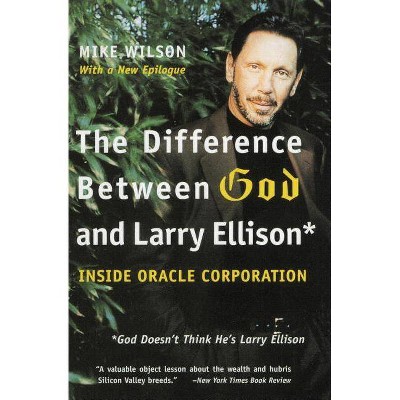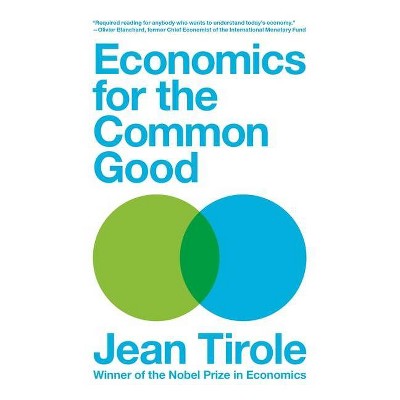Sponsored

The Economics of Belonging - by Martin Sandbu (Paperback)
$11.00Save $6.95 (39% off)
In Stock
Eligible for registries and wish lists
Sponsored
About this item
Highlights
- A radical new approach to economic policy that addresses the symptoms and causes of inequality in Western society today Fueled by populism and the frustrations of the disenfranchised, the past few years have witnessed the widespread rejection of the economic and political order that Western countries built up after 1945.
- About the Author: Martin Sandbu has been writing about economics for the Financial Times since 2009.
- 304 Pages
- Business + Money Management, Economics
Description
About the Book
Fueled by populism and the frustrations of the disenfranchised, the past few years have witnessed the widespread rejection of the economic and political order that Western countries built up after 1945. Political debates have turned into violent clashes between those who want to take their country back and those viewed as defending an elitist, broken, and unpatriotic social contract. There seems to be an increasing polarization of values. The Economics of Belonging argues that we should step back and take a fresh look at the root causes of our current challenges. In this original, engaging book, Martin Sandbu argues that economics remains at the heart of our widening inequality and it is only by focusing on the right policies that we can address it. He proposes a detailed, radical plan for creating a just economy where everyone can belong. Sandbu demonstrates that the rising numbers of the left behind are not due to globalization gone too far. Rather, technological change and flawed but avoidable domestic policies have eroded the foundations of an economy in which everyone can participate and would have done so even with a much less globalized economy. Sandbu contends that we have to double down on economic openness while pursuing dramatic reforms involving productivity, regional development, support for small and medium-sized businesses, and increased worker representation. He discusses how a more active macroeconomic policy, education for all, universal basic income, and better taxation of capital could work together for societys benefit"--Book Synopsis
A radical new approach to economic policy that addresses the symptoms and causes of inequality in Western society today
Fueled by populism and the frustrations of the disenfranchised, the past few years have witnessed the widespread rejection of the economic and political order that Western countries built up after 1945. Political debates have turned into violent clashes between those who want to "take their country back" and those viewed as defending an elitist, broken, and unpatriotic social contract. There seems to be an increasing polarization of values. The Economics of Belonging argues that we should step back and take a fresh look at the root causes of our current challenges. In this original, engaging book, Martin Sandbu argues that economics remains at the heart of our widening inequality and it is only by focusing on the right policies that we can address it. He proposes a detailed, radical plan for creating a just economy where everyone can belong. Sandbu demonstrates that the rising numbers of the left behind are not due to globalization gone too far. Rather, technological change and flawed but avoidable domestic policies have eroded the foundations of an economy in which everyone can participate--and would have done so even with a much less globalized economy. Sandbu contends that we have to double down on economic openness while pursuing dramatic reforms involving productivity, regional development, support for small- and medium-sized businesses, and increased worker representation. He discusses how a more active macroeconomic policy, education for all, universal basic income, and better taxation of capital could work together for society's benefit. Offering real answers, not invective, for facing our most serious political issues, The Economics of Belonging shows how a better economic system can work for all.Review Quotes
"The Economics of Belonging is a competent, confidently articulated survey of the academic economics literature on inequality."---Paul Collier, Prospect
"The Economics of Belonging is an important contribution to the debate about the 'left-behind'. Sandbu offers a highly readable and carefully argued narrative, which marshals evidence adroitly and proposes a range of policy prescriptions, many of which are persuasive and deserve serious attention."---John Tomaney, LSE Review of Books
"[A] brilliant, if sometimes controversial, exposition of what ails our economies and political systems."---Chris Johns, Irish Times
"A wealth of analysis and insight [in] a few hundred pages."---Peter Thal Larsen, Reuters Breakingviews
"One of Sandbu's great strengths is his ability to combine analysis of microeconomic welfare policy with macroeconomic and financial policy. . . . An important achievement of this book is to show that many measures both reduce inequality and improve productivity and growth."---Paul Segal, Journal of Economic Inequality
"Sophisticated and engaging. . . . Thorough and compelling."---Paolo Mauro, Finance & Development
"The real argument of the book comes in the second half, namely that a set of radical but feasible policies holds the solution to inequality. And, if they were implemented, Sandbu eloquently argues, more globalisation would benefit all and defang populist polarisation."---Diane Coyle, Financial Times
"This is a crisply written analysis of economic discontents and their political consequences. Though written in the pre-pandemic era, the conclusions and prescriptions of this book are very relevant to our current debates."---Paschal Donohoe, Irish Times
"Winner of the Silver Medal in Business Theory, Axiom Business Book Awards"
About the Author
Martin Sandbu has been writing about economics for the Financial Times since 2009. Having started out as the newspaper's economics leader writer, he is currently FT's European economics commentator and writes its Free Lunch premium economics newsletter. Previously, he was a senior research fellow at the Zicklin Center for Business Ethics Research at the Wharton School of the University of Pennsylvania. His books include Just Business and Europe's Orphan (Princeton).Dimensions (Overall): 8.35 Inches (H) x 5.51 Inches (W) x .94 Inches (D)
Weight: .9 Pounds
Suggested Age: 22 Years and Up
Number of Pages: 304
Genre: Business + Money Management
Sub-Genre: Economics
Publisher: Princeton University Press
Format: Paperback
Author: Martin Sandbu
Language: English
Street Date: May 17, 2022
TCIN: 84907133
UPC: 9780691228907
Item Number (DPCI): 247-32-8534
Origin: Made in the USA or Imported
If the item details aren’t accurate or complete, we want to know about it.
Shipping details
Estimated ship dimensions: 0.94 inches length x 5.51 inches width x 8.35 inches height
Estimated ship weight: 0.9 pounds
We regret that this item cannot be shipped to PO Boxes.
This item cannot be shipped to the following locations: American Samoa (see also separate entry under AS), Guam (see also separate entry under GU), Northern Mariana Islands, Puerto Rico (see also separate entry under PR), United States Minor Outlying Islands, Virgin Islands, U.S., APO/FPO
Return details
This item can be returned to any Target store or Target.com.
This item must be returned within 90 days of the date it was purchased in store, shipped, delivered by a Shipt shopper, or made ready for pickup.
See the return policy for complete information.
Frequently bought together

$15.68
Buy 2, get 1 free select books, music & movies
4.8 out of 5 stars with 192 ratings

$9.02 - $19.99
MSRP $17.00 - $19.99
Buy 2, get 1 free select books, music & movies
4.6 out of 5 stars with 566 ratings

$13.99 - $23.05
MSRP $25.00 - $40.00
Buy 2, get 1 free select books, music & movies
4.4 out of 5 stars with 198 ratings
Trending Non-Fiction

$15.68
Buy 2, get 1 free select books, music & movies
4.8 out of 5 stars with 192 ratings

$19.31
was $20.98 New lower price
Buy 2, get 1 free select books, music & movies
4 out of 5 stars with 60 ratings

$19.58
MSRP $29.00
Buy 2, get 1 free select books, music & movies
4.6 out of 5 stars with 13 ratings

$4.59
MSRP $7.99
Buy 2, get 1 free select books, music & movies
4.8 out of 5 stars with 120 ratings

$6.20
MSRP $10.95
Buy 2, get 1 free select books, music & movies
4.8 out of 5 stars with 33 ratings

$7.09
MSRP $9.99
Buy 2, get 1 free select books, music & movies
4.9 out of 5 stars with 46 ratings








